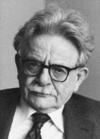- Canetti, Elias
-
died Aug. 14, 1994, Zürich, Switz.Bulgarian-born British novelist and playwright.Canetti was from a Spanish-speaking Jewish family. His best-known work, the novel Auto-da-Fé (1935), deals with the dangers in believing that detached intellectualism can prevail over evil and chaos. He settled in Britain in 1938. Later works that reflect his interest in the psychopathology of power include Crowds and Power (1960); the plays The Wedding (1932), Comedy of Vanity (1950), and Life-Terms (1964); and his series of autobiographies beginning with The Tongue Set Free (1977). He was awarded the Nobel Prize for Literature in 1981.
 CanettiHorst Tappe/Camera Press/Globe Photos
CanettiHorst Tappe/Camera Press/Globe Photos* * *
▪ 1995Bulgarian-born novelist and playwright (b. July 25, 1905, Ruse, Bulg.—d. Aug. 14, 1994, Zürich, Switz.), was awarded the 1981 Nobel Prize for Literature for his explorations of the behaviour and emotions of crowds and analyses of the individual's position in society. Born into a family of Sephardic Jews, Canetti migrated with his parents when he was six, to Manchester, England, and two years later, after the death of his father, he moved with his brother and mother to Vienna. His mother taught him German, the language of his books. He was educated in Zürich, Frankfurt, and Vienna and received (1929) a doctorate in chemistry from the University of Vienna. In 1927 Canetti witnessed a protest march during which Vienna's Palace of Justice was set on fire and 90 demonstrators were killed. This incident crystallized his interest in crowds and power. He planned an eight-novel series on extremes in human behaviour; only one was written, Die Blendung (1935; Auto-da-Fé, also published as The Tower of Babel), a nightmarish story of a scholar whose life ends in madness and conflagration. After the Nazi takeover of Austria, Canetti moved to England. There he began the work that resulted—after 10 years of research and 10 years of writing—in Masse und Macht (1960; Crowds and Power). His interest in the psychopathology of power was also evident in his three plays—Hochzeit (1932; The Wedding), Komödie der Eitelkeit (1950; Comedy of Vanity), and Die Befristeten (1964; The Numbered, also published as Life-Terms). Also published were such nonfiction works as Der Ohrenzeuge—Fünfzig Charaktere (1974; Earwitness: Fifty Characters), a book of character sketches; Aufzeichnungen 1942-1972 (1973; The Human Province), excerpts from his notebooks; three volumes of autobiography: Die gerettete Zunge (1977; The Tongue Set Free), Die Fackel im Ohr (1980; The Torch in My Ear), and Das Augenspiel (1985; The Play of The Eyes); and Die Fliegenpein (1992; The Agony of Flies), was a collection of aphorisms. A fourth volume of autobiography awaited publication.* * *
▪ Bulgarian writerborn July 25, 1905, Ruse, Bulg.died Aug. 14, 1994, Zürich, Switz.German-language novelist and playwright whose works explore the emotions of crowds, the psychopathology of power, and the position of the individual at odds with the society around him. He was awarded the Nobel Prize for Literature in 1981.Canetti was descended from Spanish Sephardic Jews. He wrote in German, his third language, his first two being Ladino (Judeo-Spanish) and English. He learned the latter when his parents settled in England. After his father's death in 1913, he moved with his mother to Vienna. Educated in Zürich, Frankfurt, and Vienna, Canetti received a doctorate in chemistry at the University of Vienna in 1929.Canetti's interest in crowds crystallized after he witnessed street rioting over inflation in Frankfurt in the 1920s and the burning by an angry mob of the Vienna Palace of Justice in 1927. A planned eight-novel saga of the disorder he saw around him was reduced to Die Blendung (1935; Auto-da-Fé, or The Tower of Babel), the story of a scholar's degradation and destruction in the grotesque underworld of a city.In 1938 Canetti immigrated to England, devoting his time to research on mass psychology and the allure of fascism. His major work, Masse und Macht (1960; Crowds and Power), is an outgrowth of that interest, which is also evident in Canetti's three plays: Hochzeit (1932; The Wedding), Komödie der Eitelkeit (1950; Comedy of Vanity), and Die Befristeten (1964; The Numbered). The first two were first performed in Braunschweig, W.Ger., in 1965 and the third in Oxford, Eng., in 1956. They were published as Dramen in 1964.In addition to novels and plays, Canetti also published Die Provinz des Menschen: Aufzeichnungen 1942–1972 (1973; The Human Province), Das Geheimherz der Uhr: Aufzeichnungen 1973–1985 (1987; The Secret Heart of the Clock), and Die Fliegenpein (1992; The Agony of Flies), all excerpts from his notebooks; and Der Ohrenzeuge: Fünfzig Charaktere (1974; Earwitness: Fifty Characters), a book of character sketches.Canetti published three volumes of autobiography: Die gerettete Zunge (1977; The Tongue Set Free), Die Fackel im Ohr (1980; The Torch in My Ear), and Das Augenspiel (1985; The Play of the Eyes). A fourth volume, written in the early 1990s, was published posthumously as Party im Blitz (2003; Party in the Blitz).Additional ReadingCanetti's life and works are discussed in Richard H. Lawson, Understanding Elias Canetti (1991), an advanced study; and Thomas H. Falk, Elias Canetti (1993), an introduction. William Collins Donahue, The End of Modernism (2001), is a study of Auto-da-Fé.* * *
Universalium. 2010.
